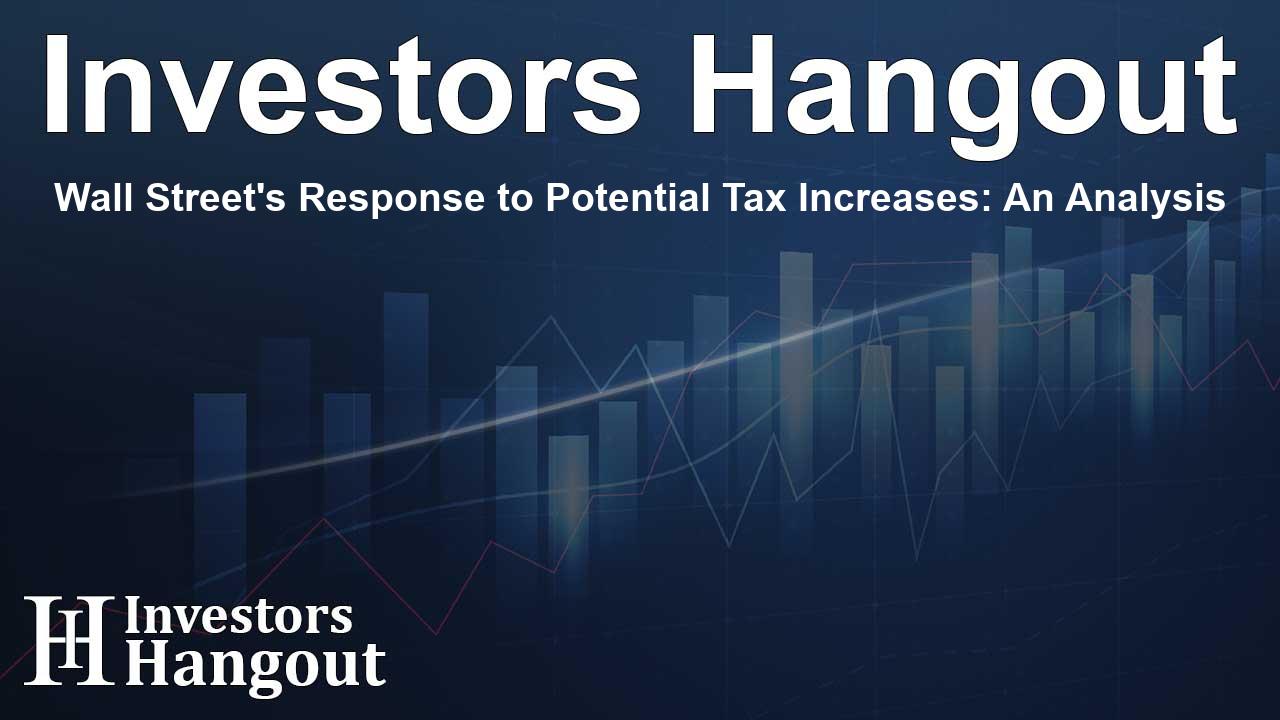Wall Street's Response to Potential Tax Increases: An Analysis

Impact of Corporate Tax Increases on Wall Street
As the nation prepares for significant decisions ahead, the potential implications of upcoming policies, particularly concerning corporate tax rates, are on the minds of many investors. With the ongoing discussions surrounding the presidential election, economic strategies proposed by candidates could significantly shape the financial landscape. This article delves into the potential repercussions of raising the corporate tax rate from 21% to 28% as proposed by Vice President Kamala Harris, and how this might influence corporate profitability and stock performance.
Understanding Corporate Taxation and Its Impacts
The proposed hike in the corporate tax rate has sparked a wave of concern among market analysts. Historically, higher tax rates could limit the capital available for businesses to reinvest in their operations, stifling growth. Scarcity of financial resources due to increased taxation can lead to reduced hiring, diminished mergers and acquisitions, and less investment in research and development. These factors are crucial since they often constitute the core activities that drive long-term profitability for firms.
The Economic Rationale Behind Tax Adjustments
With the U.S. national debt soaring past $35 trillion, the rationale for increasing taxes is primarily driven by the need to manage federal deficits. Government spending has consistently outpaced revenue generation, exacerbating this economic imbalance. Estimates suggest that raising the corporate tax rate may generate significant additional tax revenue over the coming decade, but the challenges this brings to the corporate sector cannot be underestimated.
Effects on Share Buybacks and Investor Sentiment
One less obvious consequence of an increased tax rate could be its impact on share buybacks. Companies use buybacks not just as a means of returning capital to shareholders but also as a strategy to improve earnings per share (EPS). With the ability to conduct share repurchases potentially curtailed, corporations might find their paths to enhancing profitability hindered, causing stock valuations to suffer under increased scrutiny from investors.
Does History Suggest a Silver Lining?
Interestingly, historical data reveals a pattern when it comes to corporate tax increases and stock performance. A study indicates that on average, the S&P 500 has risen following corporate tax hikes. This historical trend does not ensure similar outcomes in the future, but it does provide a sense of reassurance for investors about the resilience of the market in the past.
Valuation Concerns in Today’s Market
Yet, even amidst potential tax hikes, the conversation should not solely focus on tax implications. The current market valuations present their own set of challenges. As of now, the Shiller price-to-earnings ratio sits significantly above average, hinting that stocks might be overpriced. A market correction could very well be the result of these exorbitant valuations irrespective of tax policies, reinforcing the need for investors to remain vigilant.
Evaluating Stock Choices in a Volatile Market
Given the existing market environment, investors are left pondering whether to venture into reliable options like the S&P 500 Index. While some analysts highlight ten distinct stocks poised to outpace the index, others urge caution as the market navigates through this unpredictable terrain.
Key Considerations for Investors Moving Forward
Investors need to weigh the impacts of tax policy changes against market valuations and historical trends. Each investor’s strategy may vary based on risk tolerance and financial goals. However, keeping an eye on the evolving tax landscape as well as overall market health remains critical for successful investing.
Frequently Asked Questions
What are the potential consequences of raising corporate taxes?
Raising corporate taxes can reduce available capital for companies, potentially leading to decreased hiring, less investment in R&D, and reduced share buybacks, all of which may negatively impact stock prices.
How have corporate tax hikes historically affected the stock market?
Historically, stock prices have tended to rise following corporate tax hikes, although this trend does not guarantee future performance.
What is share buyback and why is it important?
A share buyback is when a company purchases its own shares from the market, which can enhance earnings per share and return value to shareholders.
What is the Shiller price-to-earnings ratio?
The Shiller P/E ratio measures average inflation-adjusted earnings for a company over the last decade, providing a more comprehensive view of valuation than the standard P/E ratio.
Should I invest in the S&P 500 Index given current tax proposals?
Investing in the S&P 500 Index may be a good option, but current market valuations and potential tax policy impacts should be carefully considered before making any decisions.
About Investors Hangout
Investors Hangout is a leading online stock forum for financial discussion and learning, offering a wide range of free tools and resources. It draws in traders of all levels, who exchange market knowledge, investigate trading tactics, and keep an eye on industry developments in real time. Featuring financial articles, stock message boards, quotes, charts, company profiles, and live news updates. Through cooperative learning and a wealth of informational resources, it helps users from novices creating their first portfolios to experts honing their techniques. Join Investors Hangout today: https://investorshangout.com/
Disclaimer: The content of this article is solely for general informational purposes only; it does not represent legal, financial, or investment advice. Investors Hangout does not offer financial advice; the author is not a licensed financial advisor. Consult a qualified advisor before making any financial or investment decisions based on this article. The author's interpretation of publicly available data shapes the opinions presented here; as a result, they should not be taken as advice to purchase, sell, or hold any securities mentioned or any other investments. The author does not guarantee the accuracy, completeness, or timeliness of any material, providing it "as is." Information and market conditions may change; past performance is not indicative of future outcomes. If any of the material offered here is inaccurate, please contact us for corrections.